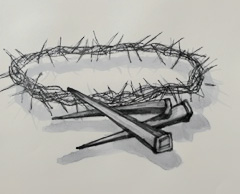“For as Jonah was three days and three nights in the belly of the whale, so will the Son of man be three days and three nights in the heart of the earth. The men of Nineveh will arise at the judgment with this generation and condemn it; for they repented at the preaching of Jonah, and behold, something greater than Jonah is here.” Matthew 12:40-41 (RSV)
The number three is significant throughout the stories of the Bible, which is not surprising since everything was created by God, who is a three in one Trinity; Father, Son and Holy Spirit.
In comparing Himself to Jonah, Jesus foretold His own resurrection on the third day. The scribes and Pharisees asked Jesus for a sign, even though their skeptical minds were already made up. He told them the only sign they will see is the sign of Jonah.
Jesus told the scribes and Pharisees to heed His words, warning them about the judgement day, but He also showed His divine mercy, by inviting all to come to Him, saying
“All those the Father gives me will come to me, and whoever comes to me I will never drive away.”
(John 6:37)
Jesus had the power and love to save anyone and the authority and grace to keep them, not turning anyone away. He boldly revealed who He was and His invitation was extended to all, scribes and Pharisees included.
After Jonah was spit out of that whale’s mouth on the third day, he finally followed God’s will and preached to the multitudes in Nineveh, and many believed.
Jesus referred to Jonah’s three day resurrection, hinting that He would also launch a ministry after He rises from the dead after three days.
The number three brings resurrection and redemption to the world.
There are so many other threes throughout scripture. Daniel was forbidden by law to pray, but he prayed three times a day, anyway.
Moses, as a baby, was kept hidden for three months, from Pharaoh’s order to kill all male babies. When Jesus was a boy, He went missing for three days, but was found on the third day in the temple, discussing scripture with the elders.
The number three brings to light all that was once hidden.
When He approached Peter, Jesus asked three times consecutively, “Peter, do you love Me?” Then He repeated three times, “Feed My sheep.” Peter said yes to all Jesus asked, but later under pressure, denied Him three times, but it wasn’t the end of the story, because Peter was changed, forgiven and became empowered by the Holy Spirit. He devoted himself to ministry and saw the same signs and wonders that Jesus did.
The number three brings a new calling and new beginnings.
The ark of the covenant was a gold covered chest that contained three relics from the miraculous exodus story. The holy ark was untouchable by human hands, because of the three items within it:
Manna, the miracle bread from heaven, Aaron’s rod, a symbol of a holy priesthood, and the tablets of the commandments, carved by the finger of God, Himself.
God gave explicit instructions for transporting the ark from place to place. It was sacred and had to be held by the poles as handles, never touched directly by any one’s hand.
Those three sacred items inside the ark all foreshadowed Jesus:
- He is the Manna, the true Bread from heaven, which He called Himself, promising to satisfy forever those who believe in Him.
- He is the eternal Priest and mediator, who told us that no one can come to the Father, except through Him.
- He is the fulfillment of those stone tablets of commandments. By faith in Him, He now writes His laws on our hearts, through the Holy Spirit.
As three relics were inside the first ark of the covenant, Jesus came into the world in an ark of human flesh. While the ark of the old covenant was a gold covered chest, the ark of the new covenant, was the womb of Mary, who carried the world’s only Messiah to full term.
The ark of the old covenant was transported to the home of Obed-Edom, where it remained for three months. (2 Samuel 6:11)
The ark of the new covenant, Mary, traveled to the home of Elizabeth, where she remained for three months. (Luke 1:56)
The number three brings the Presence of God into one’s home.
God leaves hints of His divine plan and purpose by using the number three or multiples of three in various ways. Jesus began His public ministry at age 30, and was crucified at 33. With only three brief years of ministry, God touched the entire world through Jesus, and the world has never been the same since.
Lord, as we meditate on the number three, you are the bread of heaven, our high priest and the word who became flesh. You touch all people with your love, mercy and grace, and today we open our heart and mind to receive all that you have for us. Amen
( Ark of the covenant model)
(An artist’s rendering of Mary, pregnant with Jesus)

